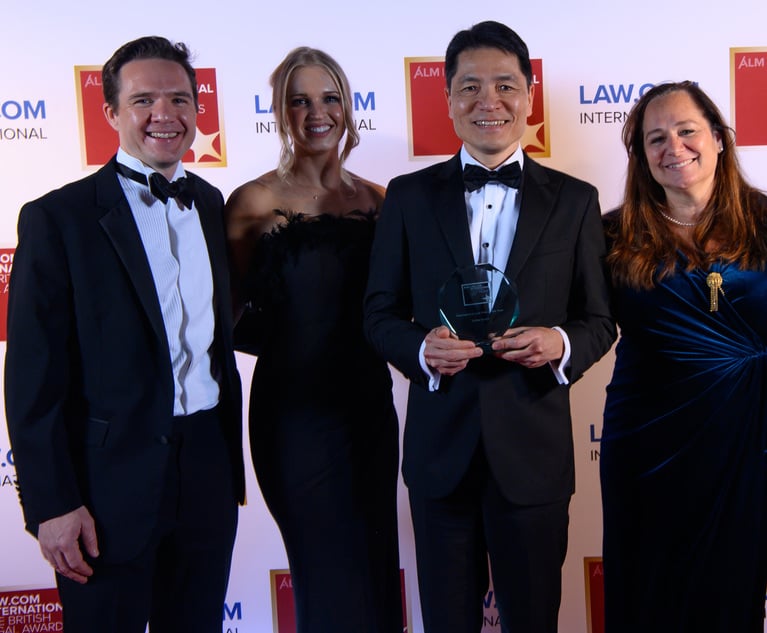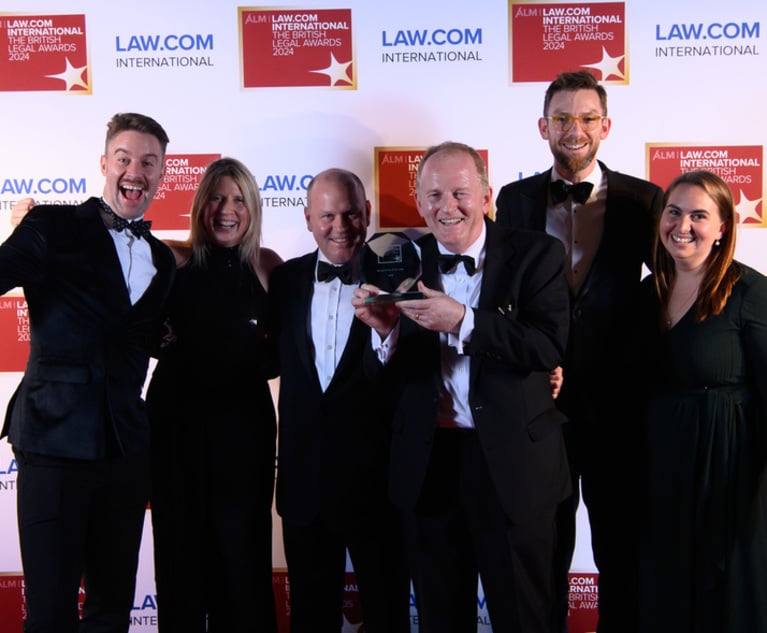Q&A: Sophie Pelé of Dechert on the Value, and Price, of COVID-19 Research
Pelé, a partner and specialist in European regulation, discusses legal issues facing companies racing to develop treatments, tests and vaccines to fight the new coronavirus.
April 01, 2020 at 06:16 PM
4 minute read
Researchers around the globe are racing to develop COVID-19 treatments, tests and vaccines that can be released safely to the public. Sophie Pelé, a national partner at Dechert in Paris and a specialist in European regulation for the health care and life sciences sectors, spoke this week with Law.com International about the legal issues involved in balancing speed with scientific rigor, and public good with financial rights.
The scientific community is under tremendous pressure to come up with treatments and a vaccine soon. What is the legal and regulatory climate in which researchers, in both the public and private sectors, are working in Europe?
While there is sharp debate among scientists about the value of clinical trials during a health crisis such as this one, the prevailing view is that we should not give up on international standards and methodology for the sake of expeditiousness. We have noticed that the authorities in Europe have softened the procedures for getting reliable clinical trials set up and approved. There is an ongoing exchange between companies and governments to tailor and organize and validate trials, and the regulators have committed to moving COVID-related reviews to the head of the line. On the other hand, there has been no discussion of relaxed standards, and no movement to relax product liability.
Health authorities have said that it will take a year to develop an effective COVID-19 vaccine, get it approved, and bring it to market. Based on your knowledge of the sector, do you think that estimate is accurate?
I think it is a fair hypothesis. I would like to think it would be sooner. But a vaccine is a new molecule, which will need to be developed. With treatments, what we are seeing is a repurposing of existing drugs for use against COVID-19. The new use will still have to be tested and approved, but a vaccine will take longer because of the development phase.
As counsel for companies involved in research and development of COVID-19 drugs and tests, what are some of the legal issues you look out for on behalf of your clients?
Aside from the regulatory process, there are issues that come up immediately during the crisis, and issues that will come up after the crisis is past.
One of the immediate issues involves financial rights. In a crisis, governments are looking for quick cooperation from companies. The discussions need to go fast, and the companies are in a poor position to negotiate over their financial rights, including prices for their products. So what you'll see is an agreement over quantities to be produced, for example, with the financial terms to be negotiated after the crisis is past. We saw this in 2009 during H1N1, or avian flu. The goal is to find the most expeditious way to provide the product and yet guarantee minimum rights for the client.
Other issues involve the consequences of making the products. Force majeure exceptions can be an issue because the contractual obligation to supply the products can come up against the difficulties of producing them: There may be a shortage of materials because of supply-chain issues, or employment issues such as the safety of your premises. And, of course, product liability in the case of adverse events always has to be taken into account.
What challenges do you expect to come up for the sector after the COVID-19 crisis is past?
The price of innovation. We can't forget that health care systems are not just targeting COVID-19. There are a lot of innovative drugs being developed, and after this crisis, health systems are likely to have acute concerns about budgets. But one of the lessons of this crisis is that it is worth investing in innovation.
NOT FOR REPRINT
© 2025 ALM Global, LLC, All Rights Reserved. Request academic re-use from www.copyright.com. All other uses, submit a request to [email protected]. For more information visit Asset & Logo Licensing.
You Might Like
View All
International Law Firm of the Year: A Q&A with Sidley Austin's London Managing Partner
5 minute read
Inside Travers Smith's AI Training, Development Efforts

From Olympic Aspirations to Legal Innovation: Tom Dunlop's Journey to Founding Summize
8 minute readLaw Firms Mentioned
Trending Stories
- 1'A Death Sentence for TikTok'?: Litigators and Experts Weigh Impact of Potential Ban on Creators and Data Privacy
- 2Bribery Case Against Former Lt. Gov. Brian Benjamin Is Dropped
- 3‘Extremely Disturbing’: AI Firms Face Class Action by ‘Taskers’ Exposed to Traumatic Content
- 4State Appeals Court Revives BraunHagey Lawsuit Alleging $4.2M Unlawful Wire to China
- 5Invoking Trump, AG Bonta Reminds Lawyers of Duties to Noncitizens in Plea Dealing
Who Got The Work
J. Brugh Lower of Gibbons has entered an appearance for industrial equipment supplier Devco Corporation in a pending trademark infringement lawsuit. The suit, accusing the defendant of selling knock-off Graco products, was filed Dec. 18 in New Jersey District Court by Rivkin Radler on behalf of Graco Inc. and Graco Minnesota. The case, assigned to U.S. District Judge Zahid N. Quraishi, is 3:24-cv-11294, Graco Inc. et al v. Devco Corporation.
Who Got The Work
Rebecca Maller-Stein and Kent A. Yalowitz of Arnold & Porter Kaye Scholer have entered their appearances for Hanaco Venture Capital and its executives, Lior Prosor and David Frankel, in a pending securities lawsuit. The action, filed on Dec. 24 in New York Southern District Court by Zell, Aron & Co. on behalf of Goldeneye Advisors, accuses the defendants of negligently and fraudulently managing the plaintiff's $1 million investment. The case, assigned to U.S. District Judge Vernon S. Broderick, is 1:24-cv-09918, Goldeneye Advisors, LLC v. Hanaco Venture Capital, Ltd. et al.
Who Got The Work
Attorneys from A&O Shearman has stepped in as defense counsel for Toronto-Dominion Bank and other defendants in a pending securities class action. The suit, filed Dec. 11 in New York Southern District Court by Bleichmar Fonti & Auld, accuses the defendants of concealing the bank's 'pervasive' deficiencies in regards to its compliance with the Bank Secrecy Act and the quality of its anti-money laundering controls. The case, assigned to U.S. District Judge Arun Subramanian, is 1:24-cv-09445, Gonzalez v. The Toronto-Dominion Bank et al.
Who Got The Work
Crown Castle International, a Pennsylvania company providing shared communications infrastructure, has turned to Luke D. Wolf of Gordon Rees Scully Mansukhani to fend off a pending breach-of-contract lawsuit. The court action, filed Nov. 25 in Michigan Eastern District Court by Hooper Hathaway PC on behalf of The Town Residences LLC, accuses Crown Castle of failing to transfer approximately $30,000 in utility payments from T-Mobile in breach of a roof-top lease and assignment agreement. The case, assigned to U.S. District Judge Susan K. Declercq, is 2:24-cv-13131, The Town Residences LLC v. T-Mobile US, Inc. et al.
Who Got The Work
Wilfred P. Coronato and Daniel M. Schwartz of McCarter & English have stepped in as defense counsel to Electrolux Home Products Inc. in a pending product liability lawsuit. The court action, filed Nov. 26 in New York Eastern District Court by Poulos Lopiccolo PC and Nagel Rice LLP on behalf of David Stern, alleges that the defendant's refrigerators’ drawers and shelving repeatedly break and fall apart within months after purchase. The case, assigned to U.S. District Judge Joan M. Azrack, is 2:24-cv-08204, Stern v. Electrolux Home Products, Inc.
Featured Firms
Law Offices of Gary Martin Hays & Associates, P.C.
(470) 294-1674
Law Offices of Mark E. Salomone
(857) 444-6468
Smith & Hassler
(713) 739-1250










